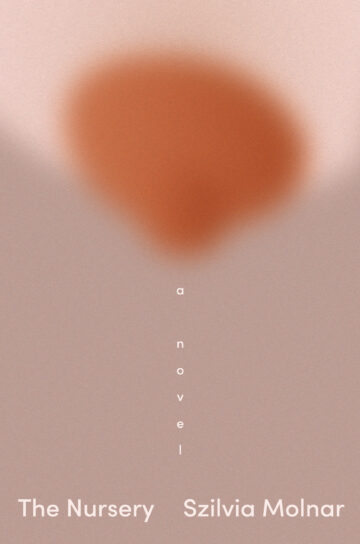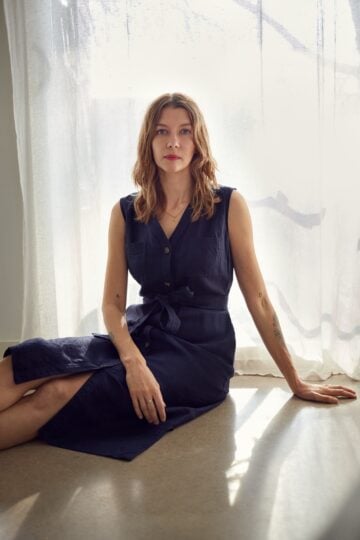Austin author Szilvia Molnar’s debut novel The Nursery, a memoir-looking work about a new mother suppressing baby-harming thoughts, is an engaging experiment in uncomfortable empathy that finds its tonal antecedents in cerebral body horror movies like David Cronenberg’s The Brood and David Lynch’s Eraserhead, and its stylistic sisterhood in the early avant-garde confessionals of French novelist and screen writer Marguerite Duras.
Expressing the parasitic pain her unnamed narrator experiences while nursing her newborn, Molnar writes: “With a hand on the back of her head, I put her face toward my nipple and a toothless mouth opens. She latches on with lips soft as a fish. I squirm from the initial discomfort of her bite.”
Our heroine, a translator of Swedish literature who refers to her infant as a leech and calls her “Button,” goes on to detail the rushed hospital room moments after delivery as a kind of bartering of bodily fluids stalled by medical devices: “Liquids poured out of me, liquids were pushed into my veins, and a catheter was pricked into my urethra.”
Molnar describes her character’s recovery with a detached, almost philosophical fatalism. “Strange how quickly blood stops being frightening after giving birth,” the postnatal protagonist observes in a morose meditation on how unadjusted she feels to her new role as a mother.

“Before Button arrived, I walked everywhere and leaving the apartment was a simple undertaking,” she says. “During a break from the library or my writing desk where most of my work takes place, I often ventured out onto the busy streets and hoped that the beat of the city would kick a word or two out in front of me, some phrase, idea, or feeling that could be of use for whatever text I was translating at the time.”
Now, at the mercy of her child’s hunger, the woman once accustomed to happily ruminating on the aesthetic possibilities inherent in root words, describes herself as “a milk bar.”
“Milk is on my skin, its residue around my nipples, dried under my breast, wet under my armpit, or milk rests in day-old sweat,” she laments the degradations linked to lactation, and asks: “When am I ever really clean anymore?”
Her not-quite-rhetorical cry addresses both the nutritious scum on her body and the sick thoughts in her mind.
Our narrator attempts to quell racing thoughts and resentments of motherhood with Google searches that look like confessions being smuggled out to the Cloud:
I suppose
I used to believe in
scribbling in notebooks
writing letters
sealing envelopes shut
slipping notes
The narrator types her catalog of nevermores into the search engine in a manner that ironically recalls the secret journal writing of the dystopian hero Winston Smith in George Orwell’s 1984, as if the only private writing a new mother might expect to accomplish must take place covertly and by itemizing the losses of personal liberties in a feigned Google search. This list of prebaby pleasures includes poetry, napping, sex, and sleeping in—all the minor marvels of a comfortable life that now exist as outlandish and out-of-reach luxuries.
At Button’s cry, our narrator’s body responds immediately and irrespective of any plans she had to take a shower: “I unhook my unapologetically maternal bra and watch my nipples leak. Small see-through white droplets drip down to the floor; My body weeps for Button.”
The succinct and almost epigram-laden language of The Nursery roils and recedes in waves of anticipation and flashback, and our narrator, who asserts that her “state might be a portrayal of the elasticity of time,” is caught between temporal intangibles.
Her husband John, a supportive mate who (upon hearing his wife’s infanticidal fantasies) will end up hiding the kitchen knives, gently mocks her by asking why Scandinavians are so obsessed with death.
When our narrator asks what he means, John reminds her that the last four books she translated were about “a wife getting cancer, a son overdosing, then a child dying, and then a mother dying right after giving birth.”

John’s assessment is not exactly off. The Nursery explores an OCD-level of superstitious dread that has our heroine’s internet searches going from concerns about the dangers of swaddling to questions about whether or not one can die from sleep deprivation or a bleeding anus.
Her infatuation with death, in fact, extends also to the merely decrepit, as she has a strange attraction to a recently widowed elderly upstairs neighbor named Peter who carries an oxygen tank around, plays the accordion, and is some kind of expert on moss. “As gullible as any lovestruck girl, I find myself hoping that he will come visit again,” she says and starts to count the ways she might accidentally kill her baby.
Our protagonist’s stab at self-soothing takes the form of daydreams about a “sacred island” birthing center where a mom can leave her child to the elements and receive no judgment.
“Picture a giant maternity ward on top of a mountain. That’s where we should give birth because there we will be smothered in nurses and pillows, pampered with dim lights, fresh fruit, ice cream, croissants, olives, cheese, and foot rubs,” she rhapsodizes, extending the utopic amenities to a job-placement program and housing help should the worst case scenario occur. “If the baby doesn’t survive but you do, you are granted permanent residency on the island. You may pursue any unfulfilled dream on the island. Be an artist or a baker, a chemist or a welder, a sailor or a French teacher. Take that ikebana class you’ve always wanted to. The place is big enough for you to carve out a new life of your own choosing and small enough not to frighten you about making a change.”
Fantasies of mythical midwifery in this Thomas Mann-like Themyscira give way to the harsh fluorescents of hospital birth, and pamphlets that ask new moms: “Do you wish to harm your child?”
The tenebrous attention Molnar offers to her taboo topic is, outside of transgressive cinema, almost never examined, let alone made into such art. Works this brave are not allowed to exist unless they are exceptional.
The Nursery, which impossibly exists as the inaugural example of a page-turner about postpartum depression, might also be the last word on the subject.







